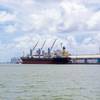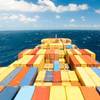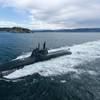Gas As Ship Fuel, GL Forum
Gas as ship fuel was the topic of the March 18 GL First Class Exchange Forum which highlighted GL's approach towards the environmental concerns of the maritime industry. The forum addressed all aspects related to LNG as an alternative ship fuel.
Invited speakers presented the LNG supply chain development from a ship owner's and gas terminal operator's view. Regulatory developments at IMO were explained by a representative of the Federal Ministry of Transport, Building and Urban Affairs, Germany. Details about a joint industry project on a gas-fuelled container feeder vessel were discussed by representatives of Germanischer Lloyd (GL), MAN Diesel and TGE Marine Gas Engineering, a specialist in the design and construction of cargo handling systems for ships and offshore units carrying liquefied cryogenic gases. Flensburger Schiffbaugesellschaft (FSG) evaluated first results of the research project GasPax while the issue of gas bunkering was addressed by GL.
In his introduction Torsten Schramm, COO of GL's Maritime Services, raised the question, how the maritime industry could reduce its environmental impact while remaining competitive, or even better, save costs. "In the end, emissions boil down to the quality of fuel. We all know that heavy fuel oil has its merits cost wise but contributes to a rather negative image of shipping."
Dr. Pierre C. Sames, GL's Senior Vice President Strategic Research and Development, mentioned that there appears to be general consensus on developing gas engines that can be used on vessels operating regular or shorter routes. Coastal shipping, which accounts for more than 33% of the world's fleet, will be subject to more stringent controls than liner container vessels. "LNG fuel is a viable alternative to heavy fuel oil," he said. The environmental benefits of LNG as a fuel are well documented, with zero sulphur-oxide emissions and much lower CO2 as well as significantly reduced nitrogen-oxide and particle emissions compared to standard marine fuels. "Coastal traffic can benefit from LNG fuel, especially as regional emission control areas are tightened or coming into force."
More than 140 experts from all over Europe gathered at GL's new head office in Hamburg to discuss the status and trends of using gas as ship fuel. The opportunity to analyze the implication of LNG as ship fuel correlates with discussions at IMO. Its sub-committee on Bulk Liquids and Gases (BLG) is working on new regulations to meet present demands for safety standards in the use of natural gas as a marine fuel. Interim guidelines by IMO are available in June 2010 and the IGF-Code is planned to enter into force with the SOLAS 2014 revision. GL will publish its own guideline on using gas as a fuel in the beginning of April 2010 to complement IMO interim guidelines.
The next GL First Class Exchange Forum will deal with the topic of safety and design aspects of passenger vessels and is planned for the end of April.










